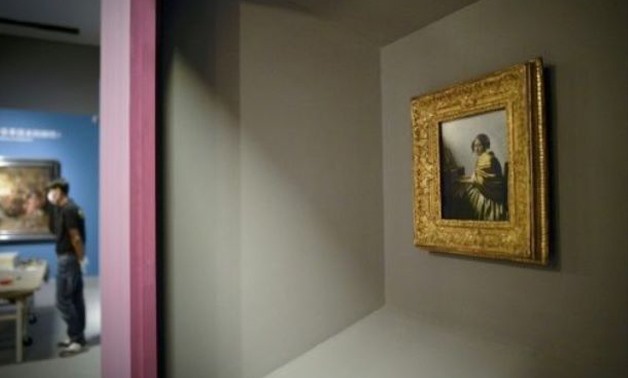
Johannes Vermeer's "Young Woman Seated at a Virginal" is displayed as part of the Masterpieces from The Leiden Collection exhibition at China's National Museum in Beijing.-AFP
BEIJING - 17 June 2017: Standing in a dimly-lit gallery space in China's National Museum, the owner of the world's only privately-held Vermeer gazed at the small oil painting for a long moment, before showing it to the assembled press.
Since American billionaire Tom Kaplan purchased the piece in 2008, it has spent most of its time on loan to various museums around the world.
When the investor -- who made his fortune betting on precious metals and natural gas -- and his wife began buying up works by 17th century Dutch painters in 2003, their goal was to take "paintings from the private domain and return them to the public", he said.
Now the collection is set to find its biggest audience yet when a selection of around 70 of its more than 250 works goes on show from Saturday through September 3 just steps from the mausoleum of Communist China's founder Mao Zedong on Tiananmen Square.
China is the first stop on a world tour of the works, known as the Leiden Collection after the Dutch town where many of its contributors plied their trade during the European nation's golden age.
After three months in Beijing, the exhibition will move to a private museum in Shanghai before heading to Russia and then the United Arab Emirates.
The National Museum, according to officials, has passed the Louvre to become the world's most visited, and if all goes according to plan, the exhibition will see hundreds of thousands of visitors flood through its doors.
While the Vermeer is a showstopper, the exhibit is built around the Kaplans' collection of 11 Rembrandts and focuses on the artist's evolution and influence on his contemporaries.
It is a major step towards achieving the couple's goal of promoting the Dutch master's legacy to an international audience, an effort which Kaplan believes will be greatly boosted by a positive reception in China.
"The cultural influence of China is going to multiply in the next decade," he said, adding that the painter's future will "be very different depending on the way China reacts to his art".
"The country will hopefully embrace Rembrandt for the genius he is."
Kaplan expresses a fervent belief in the transformative power of art, promoting his favourite painter with an almost missionary zeal.
The investor discovered the artist during a visit to the New York Museum of Metropolitan Art when he was six years old, sparking a life-long obsession with the Dutch master.
He and his wife began collecting Rembrandts after a chance encounter in 2003 with a renowned art expert, who informed him that many of the paintings remained in private hands and were available for purchase.
The couple soon began snatching up works from the era, buying "on average a painting a week for five years," Kaplan said.
He believes Rembrandt's power lies in his universality and the revolutionary message hidden in his work: "Beauty is truth. It's humanity. That's our salvation."
Rembrandt lived in an era when the Netherlands was a global trading powerhouse in the 17th century, something that should resonate with many Chinese visitors to the exhibition, who are grappling with their own country's sudden access to wealth.
"We believe very strongly that perhaps uniquely Rembrandt can serve as (a) bridge," he said.
"(Rembrandt) is truly a universal artist from whose DNA we've seen art all over the world be able to find its freedom and liberation."
As attendees leave the exhibition, they will be confronted by a wall of paintings captioned with an admonition to "Beware of Riches."
It is a timely, if perhaps unintentional, warning for a country that is grappling with rampant corruption, as well as a spiritual malaise linked to what many see as increasingly pervasive materialism.
While the exhibition is expected to receive a warm welcome in China, the underlying message might find a less eager audience.
The concept of "universal values" is not a popular one in modern China, where the government of President Xi Jinping has demonstrated an almost reflexive distaste for the kinds of "Western" ideals Kaplan embraces.
But the billionaire has no interest in lecturing. Rembrandt, he said, speaks for himself.


Comments
Leave a Comment